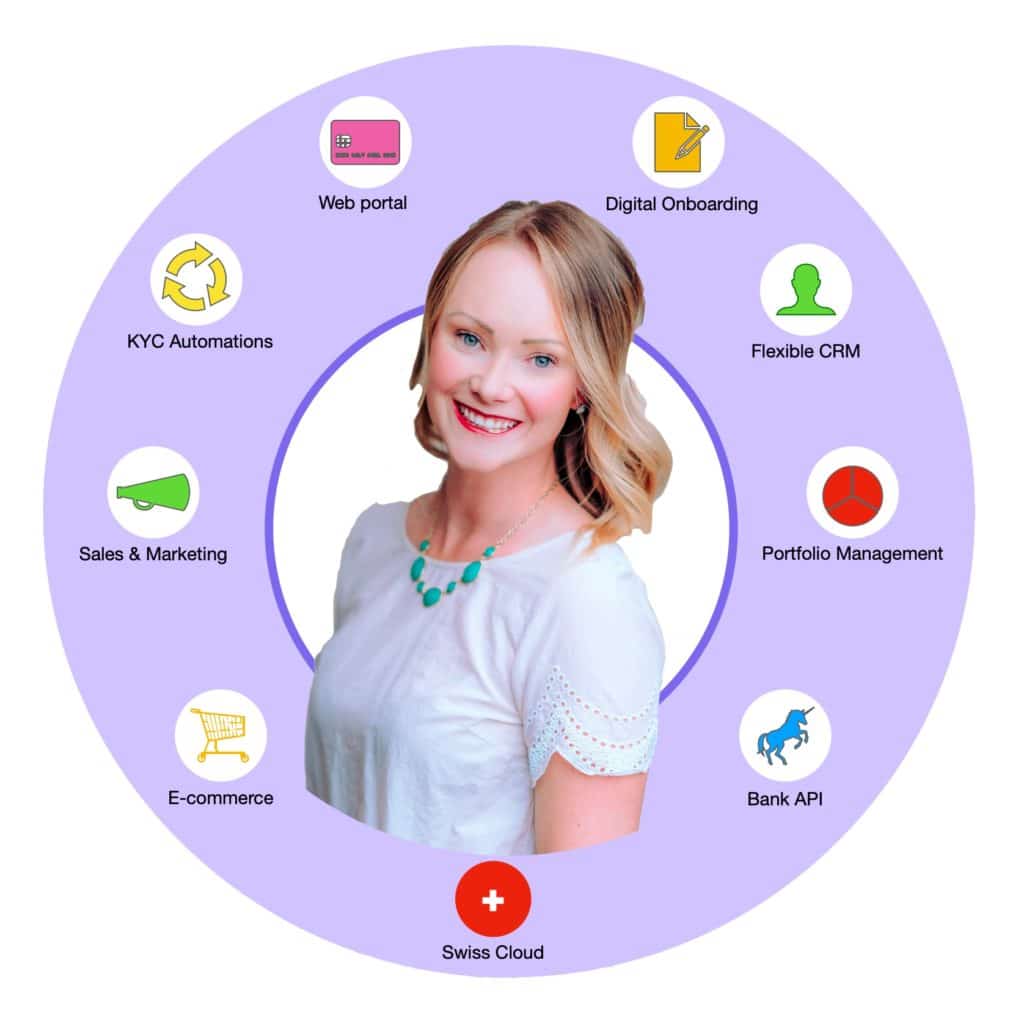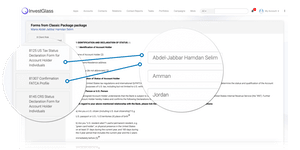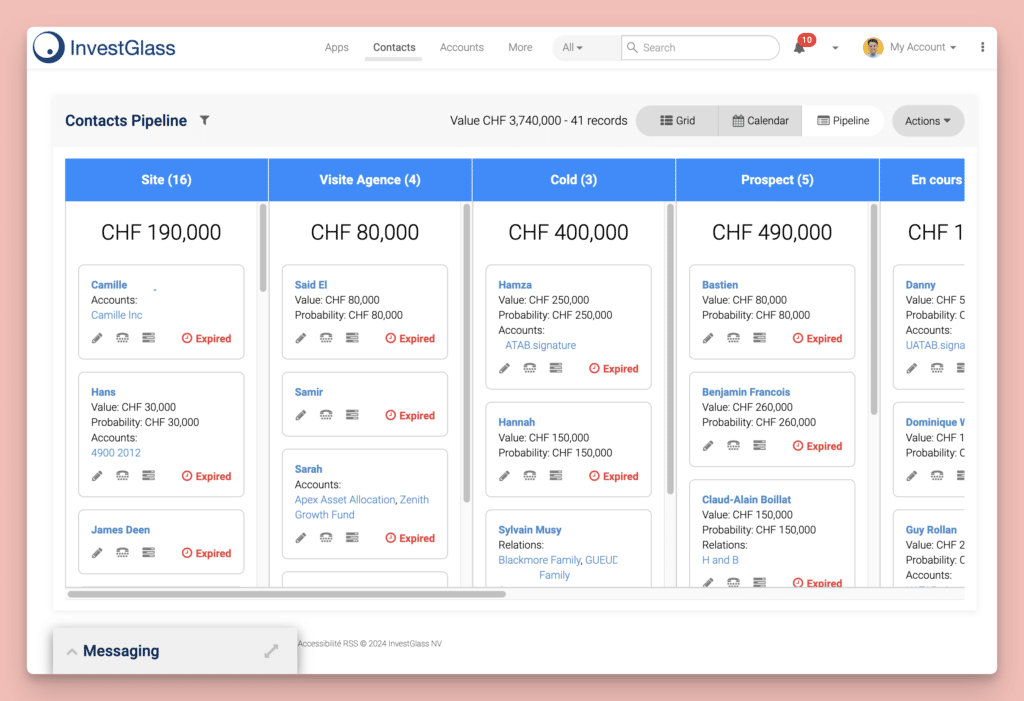Mastering the Customer Relationship Management Process: Key Steps and Benefits

The customer relationship management process is essential for helping businesses organize and optimize interactions throughout the customer journey. By focusing on key steps such as lead generation, customer data management, and improving service quality, businesses can enhance relationships, boost sales, and achieve greater customer satisfaction. For organizations prioritizing data sovereignty and residency, solutions like InvestGlass—available on-premise or hosted on the Swiss Cloud—offer unparalleled security and compliance to support these goals.
Key Takeaways
- CRM is a strategic approach that enhances sales growth and customer relationships through effective management of customer interactions.
- Key components of the CRM process include contact management, lead management, and sales automation, which collectively improve business efficiency.
- Implementing a successful CRM strategy involves continuous improvement, data quality management, customer retention, and aligning CRM actions with overall business goals.
Understanding the CRM Process

Customer relationship management is more than just a system; it’s a strategic approach that helps businesses manage interactions with customers to drive sales growth and improve relationships. Staying connected to customers and streamlining processes helps businesses improve profitability and foster strong customer relationships.
The benefits of CRM are manifold. It promotes interdepartmental collaboration and enhances customer service. With improved customer relationships, increased sales, better data analysis, and effective customer segmentation, businesses can make informed decisions and unlock new opportunities. Grasping the CRM process allows businesses to start reaping these benefits.
Key components of the CRM process include contact management, lead management, and sales automation. These elements work together to create a cohesive system that enhances overall business efficiency. Integrating these components allows businesses to save time, enhance efficiency, and improve customer service.
What is CRM?
At its core, CRM stands for Customer Relationship Management. It is designed to administer interactions with customers and manage various customer touchpoints to drive sales growth. Acting as a central repository for customer profiles and real-time sales reports, CRM provides a unified view of every prospect and customer. This comprehensive view enhances relationship management and helps businesses understand customer requirements better.
CRM systems compile various types of customer data from channels such as websites, telephone, and live chat. This data centralization leads to customer-centric strategies and reliable information, leveraging crm technology.
Cloud-based CRM systems enable teams to access data remotely, thereby facilitating collaborative efforts within the organization.
Key Components of the CRM Process
The CRM process is built on several key components, including customer profiling, each playing a vital role in managing customer relationships. Contact management includes essential details such as name, email address, phone number, work details, and past communications. Tools like InvestGlass CRM offer features like sales pipeline management, automated email sequences, and tracking customer interactions to enhance contact management.
Lead management is another crucial component, allowing businesses to track and cultivate potential customers effectively. Sales automation increases salesperson productivity by automating repetitive tasks.
These components, when integrated, form a cohesive CRM process that enhances overall business efficiency.
Generating Brand Awareness and Lead Generation

The first step in the CRM process is customer acquisition by identifying potential customers. Generating brand awareness follows this initial step. Targeted marketing campaigns play a significant role in capturing the interest of these potential customers. Marketing efforts such as advertising, social media campaigns, and content creation are crucial in generating leads.
Data analytics enhances customer segmentation, enabling focused marketing efforts. This targeted approach ensures that marketing campaigns are effective and reach the right audience.
Marketing Automation
Marketing automation significantly automates essential marketing activities, including targeted emails and social media posts. By integrating CRM with marketing automation platforms, businesses can enhance their marketing efforts through techniques like customer segmentation, drip marketing campaigns, and social media advertisements.
Effective lead generation begins with creating marketing campaigns tailored to specific audience segments to maximize engagement. This personalized approach ensures that potential customers receive relevant content, increasing the chances of conversion and customer engagement.
Collecting and Organizing Customer Data

Centralizing customer data is crucial for making data-driven decisions. CRM tools gather important client information, making it easier for teams to engage meaningfully with customers. Legal compliance is essential in customer data collection, necessitating awareness of relevant data protection regulations and data governance.
Data cleaning involves regularly checking for errors and inconsistencies in customer data to maintain quality. High-quality data is essential for developing personalized customer experiences. It also plays a crucial role in customizing marketing strategies. By organizing customer data effectively, businesses can better understand customer needs and preferences.
Customer Data Collection Techniques
Marketers gather customer data from several sources. These include lead generation forms, surveys, and social media, all while ensuring data privacy. The types of data typically collected include contact information, demographics, preferences, purchase history, and interaction details. Online forms and chatbots are effective tools for collecting this data efficiently.
Collecting customer data is essential for businesses as it allows them to understand customer needs and preferences, ultimately enhancing relationship management. Effective data collection techniques ensure comprehensive information is gathered for better customer relationship management.
Importance of Data Quality
Challenges that organizations face with poor data quality include disorganized data, poor data management, incomplete records, and poor-quality inputs. Struggles to achieve a single view of the customer and tracking customer journey become difficult as a result of unorganized data sets.
Evaluating customer data is crucial for understanding collected data and identifying additional points needed for richer insights. Ensuring data integrity is essential in CRM to drive successful initiatives and decisions.
Managing Leads Effectively
Lead management involves assigning leads, tracking interactions, and lead nurturing throughout the CRM process. Effective lead management processes include the systematic organization of leads from initial contact to conversion. InvestGlass CRM is one of the tools that assist organizations in managing customer interactions. It also helps track leads and opportunities while automating sales processes.
Effective lead management enhances conversion rates and builds stronger customer relationships. The following subsections will delve into the specifics of lead assignment and tracking, and personalized communication.
Data Sovreignty and Residency
Data sovereignty and residency have become critical considerations for businesses using CRM solutions, especially when managing the entire customer lifecycle. A robust CRM tool ensures that business data is securely stored and accessible while enabling sales and marketing departments to optimize their efforts. With features like sales force automation, contact center automation, and agent’s desktop tools, companies can automate repetitive tasks and streamline ongoing management.
Operational CRM focuses on improving various customer interactions by enabling contact center agents to access customer information instantly, making providing customer support more effective and enhancing the customer experience. Meanwhile, analytical CRM empowers businesses to analyze customer data, including historical data, to identify profitable customers, improve engagement with existing customers, and attract new customers through informed geographic marketing campaigns.
For business-to-business organizations, cloud CRM and collaborative CRM allow sales reps and marketing departments to work seamlessly, improving the contact center agent’s job efficiency while maintaining compliance with local regulations. By leveraging these software tools, companies can ensure satisfied customers through personalized outreach and proactive support, ultimately driving loyalty and making more informed business decisions.
Lead Assignment and Tracking
Lead management includes the systematic assignment of leads to sales teams to enhance conversion rates. Automated workflows assist in lead management by streamlining processes, ensuring relevant information is provided, and enabling timely follow-ups.
Every stage of the buyer’s journey should correspond with a similar stage in the sales pipeline. This connection is essential for effective progression in the customer lifecycle. In a lead’s profile, one can view recent activities, prior communication, and any complaints raised, ensuring a comprehensive understanding of the lead’s status.
Personalized Communication
Personalized communication plays a crucial role in enhancing customer engagement by making interactions more relevant and meaningful. Building strong customer relationships is fostered through personalized communication, which leads to increased customer loyalty and satisfaction.
Tailoring messages and offers based on customer insights, data, and preferences creates a more personalized experience, effectively nurturing leads. The key benefits of personalized communication in the CRM process include higher engagement rates, improved customer retention, and increased sales conversions.
Enhancing Sales Processes and Opportunity Tracking

Lead management encompasses the entire journey from generating a lead to converting that lead into a sale. The CRM process assists in managing the sales pipeline effectively, allowing businesses to track opportunities as leads progress through the sales process and improve sales performance. A lead scoring system helps prioritize leads based on their potential for conversion by assigning points based on various criteria.
Automated systems can distribute leads based on various criteria, such as user capacity and availability. The Round Robin Algorithm is often employed to ensure an equitable distribution of leads among team members. CRM systems provide real-time visibility into the sales pipeline, enabling informed decision-making for opportunity prioritization.
Sales Pipeline Management
Pipeline management assists salespeople by providing clarity on the status of each lead. This enables them to make informed decisions about which leads to pursue. The pipeline management feature provides a visual representation of current leads and deals, enhancing the ability to determine which leads to focus on.
Pipeline management organizes deals based on their current stage in the sales process and incorporates sales metrics to track progress. This helps in tracking progress and managing sales effectively. This visual organization helps sales teams manage their workload effectively and prioritize leads that are most likely to convert.
Sales Forecasting
CRM processes large amounts of data to anticipate future sales. Predictive modeling in sales forecasting gives an approximate understanding of pipeline efficiency, helping businesses plan their strategies more effectively. Sales representatives gain a clear view of their pipeline for more accurate forecasting.
Analyzing past sales and current leads enables businesses to make informed decisions about future sales efforts. This predictive capability is essential for optimizing sales strategies and achieving business goals.
Building Strong Customer Relationships
Building strong customer relationships is the foundation of a successful business. Customer relationship management (CRM) is a process that helps companies manage their customer relationships in a more orchestrated and efficient way. By using CRM software, businesses can track and manage customer interactions, including contact information, purchase history, and preferences. This information can be used to create personalized customer experiences, improve customer satisfaction, and increase customer loyalty.
Effective customer relationship management involves understanding the customer’s needs, preferences, and behaviors. This can be achieved by collecting and analyzing customer data, such as demographic information, purchase history, and customer feedback. By analyzing this data, businesses can identify patterns and trends that can help them tailor their marketing efforts, improve customer service, and increase sales.
Strong customer relationships are built on trust, communication, and mutual benefit. Businesses that prioritize customer relationships are more likely to retain customers, increase customer loyalty, and drive long-term growth. By using CRM software and implementing effective customer relationship management strategies, businesses can build strong customer relationships that drive success.
Delivering Superior Customer Service

CRM systems provide customer service teams with access to a customer’s history, enabling better support. The customer service processes effectively manage customer inquiries, issues, and requests, leading to increased customer loyalty by enhancing satisfaction and reducing complaints. Utilizing CRM tools supports customer service operations, allowing teams to track interactions and tailor their responses accordingly.
Analyzing customer feedback and data through CRM provides insights to tailor offerings, which can further improve satisfaction. Customer insights derived from CRM data enable businesses to refine their operations and enhance customer experiences.
CRM software allows for fast, personalized support by giving service teams immediate access to customer interaction history.
Customer Support Integration
Integrating customer support with CRM provides a comprehensive view of customers for proactive query resolution. Social CRM enhances customer support by allowing real-time communication through various social media platforms. Marketing automation enhances CRM processes by automating the delivery of personalized content, which increases customer engagement.
Integrating customer support functions within CRM systems is essential for providing seamless service. This integration ensures that all customer interactions are recorded and accessible, enabling support teams to offer timely and relevant assistance.
Case Resolution and Follow-Up
CRM systems improve case resolution speed, which contributes significantly to customer satisfaction. Effective follow-up on resolved cases through CRM helps maintain strong relationships with customers. Timely case resolution is crucial for maintaining strong customer relationships.
A combination of timely resolution and diligent follow-up ultimately fosters customer loyalty and retention. Addressing customer issues promptly and following up enhances overall customer satisfaction and loyalty.
Fostering Customer Loyalty and Retention
Using CRM tools and customer loyalty programs helps businesses offer tailored customer experiences based on individual preferences. Tailoring communication to the specific needs and preferences of leads can significantly improve engagement and conversion. Long-term customer relationships are cultivated through personalized interactions and attentive communication.
Personalization increases customer satisfaction, leading to enhanced loyalty. Effective CRM practices enable businesses to enhance customer experiences, fostering trust and loyalty. A well-structured CRM process enhances customer retention and boosts sales performance.
Loyalty Programs
Loyalty programs are essential for building customer engagement, retention, and long-term relationships. CRM systems provide the tools needed to effectively create, manage, and analyze customer loyalty programs. Implementing loyalty programs can increase customer lifetime value, improve customer satisfaction, and enhance brand loyalty.
Customer rewards foster a stronger connection and encourage repeat purchases.
Feedback and Improvement
Customer feedback is essential for refining products and services to meet evolving needs. Regular customer feedback collection helps identify areas for improvement in products and services. Integrating customer feedback into business strategies enhances product offerings and service quality.
Actively seeking and incorporating feedback ensures businesses meet customer expectations and continuously improve their offerings. This process helps in building stronger, more loyal customer relationships.
Utilizing Data Analysis and Insights
CRM data offers valuable information regarding customer behavior and preferences. It also reveals important trends in the market. Analyzing purchase history and lead interactions allows for the customization of follow-ups and messaging strategies. Identifying trends and pain points within customer data helps in implementing effective strategies for improvement.
Sales forecasting through CRM systems helps identify trends by analyzing large volumes of data, aiding in strategic planning. Utilizing metrics such as Net Promoter Score can gauge customer loyalty and inform service enhancements.
Reporting and Analytics
Reporting and analytics capabilities of CRM systems are essential for monitoring performance metrics and measuring success. Sales performance can be summarized effectively in a reporting and analytics dashboard to give teams insight into progress.
Integrating CRM with marketing automation tools enables businesses to track the performance of marketing campaigns to optimize future efforts. Reports generated by CRM systems can be exported in different formats to accommodate various business needs.
Predictive Analytics
Predictive analytics in CRM helps businesses forecast customer behavior and sales trends more accurately. AI-powered tools in CRM can enhance predictive analytics by providing deeper insights into customer data. Predictive modeling within CRM helps businesses forecast customer behavior and optimize marketing strategies.
These insights enable businesses to make informed decisions and stay ahead of market trends.
Improving Efficiency and Productivity
Improving efficiency and productivity is essential for businesses to stay competitive in today’s fast-paced market. Customer relationship management (CRM) software can help businesses streamline their sales, marketing, and customer service processes, making them more efficient and productive.
By automating routine tasks, such as data entry and lead tracking, CRM software can free up sales teams to focus on high-value activities, such as building relationships and closing deals. Additionally, CRM software can provide real-time visibility into customer interactions, enabling businesses to respond quickly to customer needs and preferences.
Effective CRM implementation can also help businesses reduce costs and improve resource allocation. By analyzing customer data and behavior, businesses can identify areas where they can optimize their processes, reduce waste, and improve productivity. By streamlining their operations and improving efficiency, businesses can increase revenue, reduce costs, and drive growth.
Continuous Improvement of CRM Practices
The CRM process is iterative, meaning it requires ongoing adjustments and enhancements based on customer interactions and data insights. Key activities for a successful CRM strategy include analyzing data, assessing the effectiveness of implemented strategies, and adapting to evolving customer needs.
Implementing data governance policies helps ensure the quality and accuracy of collected customer data, which is critical for continuous CRM improvement. Continuous improvement ensures that CRM practices remain effective and aligned with business goals.
Aligning CRM Strategy with Business Goals
Knowing your business goals is essential for crafting an effective CRM strategy. Factors to consider when aligning CRM strategy with business goals include target audience, industry trends, and competitive landscape.
Understanding customer preferences and behaviors is crucial for aligning CRM actions with business objectives. This alignment ensures that CRM efforts contribute to achieving overall business success.

Regular Training and Updates
Implementing a structured employee training plan helps guide your team effectively in using the new CRM system. Including various training methods caters to different learning styles, enhancing employee understanding of the CRM.
Ongoing support and resources, such as user manuals, are crucial for employees to retain knowledge about the CRM. Refresher courses should be scheduled whenever the CRM platform receives updates to ensure employees can effectively use new features.
Effective CRM Implementation
Effective CRM implementation is critical for businesses to achieve their customer relationship management goals. By implementing a CRM system, businesses can streamline their sales, marketing, and customer service processes, making them more efficient and productive.
Effective CRM implementation involves several key steps, including:
- Defining CRM goals and objectives
- Selecting the right CRM software
- Implementing the CRM system
- Training employees on CRM best practices
- Continuously monitoring and evaluating CRM performance
By following these steps, businesses can ensure that their CRM implementation is successful and drives real results. This can involve improving customer satisfaction, increasing customer loyalty, and driving revenue growth.
Additionally, effective CRM implementation requires ongoing maintenance and support. This can involve regularly updating CRM software, providing ongoing training and support to employees, and continuously monitoring and evaluating CRM performance.
By prioritizing effective CRM implementation, businesses can ensure that their customer relationship management efforts are successful and drive long-term growth.
Selecting the Right CRM Solution
CRM implementation is crucial for understanding who will use the CRM and their specific needs, which is essential for selecting the right system. A CRM solution should satisfy all criteria of the business framework to be effective. Startups should prioritize scalability and cost that aligns with their growth expectations. We believe that your data deserve a geopolitical safe choice with InvestGlass hosted in Swiss servers.
For solo-preneurs, efficiency should take precedence over complexity when selecting a CRM. Various CRM products are available for different business categories, addressing diverse organizational needs. Cost considerations for a CRM solution include monetary investments and adjustments needed for existing operations.

Evaluating Features and Benefits
CRM systems typically include eight essential features such as sales automation, pipeline management, and marketing automation. Conducting a thorough feature evaluation is important to ensure that your CRM can integrate with existing marketing technology (martech) tools to avoid integration issues.
SMBs often require CRM systems that offer precise functionality without unnecessary features, allowing for flexibility in their operations. CRM tools provide various features that aid in managing customer relationships effectively, enhancing overall business performance.
Cost Considerations
When choosing a CRM solution, it’s important to conduct a cost analysis to consider both upfront costs and the potential return on investment. Total cost considerations for CRM include hidden costs such as data migration, integration expenses, and customer support fees.
CRM pricing can vary widely, typically ranging from $10 per user per month to hundreds, depending on features and user count. Understanding the overall cost evaluation involved is crucial for making an informed decision.
Conclusion
In summary, mastering the customer relationship management process involves understanding its key components and benefits. From generating brand awareness and lead generation to delivering superior customer service and fostering customer loyalty, each step is crucial for business success. Effective data analysis and continuous improvement of CRM practices ensure that businesses stay ahead of the curve.
By selecting the right CRM solution and aligning it with business goals, businesses can enhance customer satisfaction, engagement, and retention. Implementing a successful CRM strategy will drive growth, improve customer relationships, and ultimately boost profitability. Embrace the power of CRM and transform your customer relationship management approach today.
Frequently Asked Questions
What is the primary purpose of InvestGlass CRM?
The primary purpose of CRM is to enhance customer relationships and drive sales growth by effectively managing the customer relationship management process. This leads to improved efficiency and increased revenue.
Why is data quality important in CRM?
Data quality is crucial in CRM as it ensures effective decision-making and successful initiatives; poor data quality can result in disorganized records and challenges in understanding the customer journey. Therefore, maintaining high-quality data is imperative for optimal CRM performance.
How does CRM enhance customer service?
CRM enhances customer service by giving teams access to comprehensive customer histories, which facilitates better support and quicker case resolution, ultimately resulting in enhanced customer loyalty and satisfaction.
What are the benefits of personalized communication in CRM?
Personalized communication in CRM significantly boosts customer engagement by ensuring that interactions are relevant and meaningful, which in turn leads to improved customer retention and increased sales conversions. Ultimately, tailoring communication fosters stronger relationships with customers.
What factors should be considered when selecting a CRM solution?
When selecting a CRM solution, it is crucial to consider user needs, desired features, integration capabilities, scalability, cost, and potential return on investment. These factors will help ensure that the solution meets your organization’s requirements effectively.